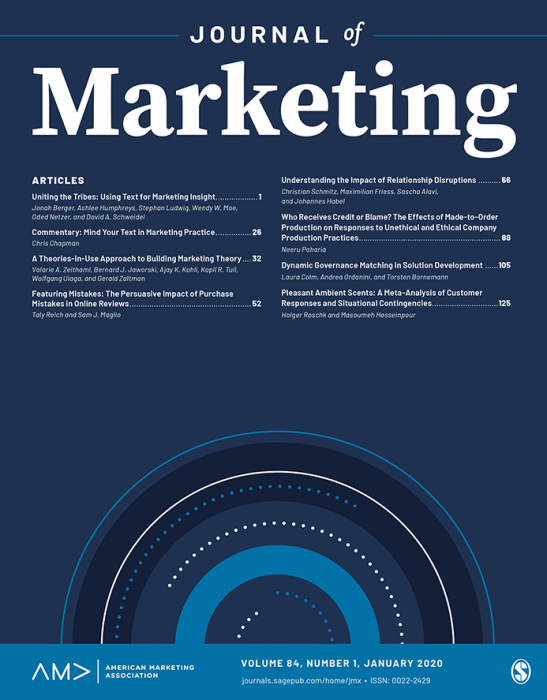EXPRESS: When Do Marketing Ideation Crowdsourcing Contests Create Shareholder Value? The Effect of Contest Design and Marketing Resource Factors
IF 11.5
1区 管理学
Q1 BUSINESS
引用次数: 0
Abstract
Firms often use crowdsourcing contests to develop marketing ideas and solutions. Despite this prevalence—and unique aspects—of marketing ideation crowdsourcing contests (MICC), there has been little examination of these contests’ shareholder wealth implications. Adopting a signaling perspective, we conduct an event study of 508 MICC announcements and find that they are associated with higher returns, but also higher idiosyncratic risk—indicating investors hold a mixed view of such contests. Further, we consider how contest design factors and firm marketing resources may signal the cultivation of intellectual and relational market-based assets to shape their stock market impact—providing firms guidance to better design their MICCs. Specifically, we find returns are enhanced when using professional (vs. general public) contests, specifically scoped contests, contests using crowd judging (vs. expert panels), and for firms with stronger marketing capabilities. However, brand factors have mixed effects on returns with a brand’s relevant stature having a positive effect and its energized differentiation having a negative effect on returns. Product MICCs and generally scoped contests heighten the negative effects on risk while marketing resources have no impact. Results offer implications for practitioners, including the finding that many MICC design choices commonly used in practice (i.e., general public contests and expert panels) are viewed less favorably by investors.快报:营销创意众包竞赛何时创造股东价值?竞赛设计与营销资源因素的影响
公司经常利用众包竞赛来发展营销理念和解决方案。尽管营销创意众包竞赛(MICC)很流行,而且有其独特之处,但很少有人研究这些竞赛对股东财富的影响。采用信号传导的观点,我们对508家中等收入公司的公告进行了事件研究,发现它们与更高的回报有关,但也与更高的特殊风险有关,投资者对这种竞争持有不同的看法。此外,我们还考虑了竞赛设计因素和企业营销资源如何暗示智力和关系市场资产的培养,从而塑造其股票市场影响,从而为企业更好地设计其MICCs提供指导。具体来说,我们发现当使用专业(与一般公众)竞赛,特别是范围竞赛,使用人群评判(与专家小组)的竞赛以及具有更强营销能力的公司时,回报会增加。然而,品牌因素对回报的影响是混合的,品牌的相关地位有积极的影响,而其充满活力的差异化对回报有消极的影响。产品MICCs和一般范围的竞赛加剧了对风险的负面影响,而营销资源没有影响。结果为从业者提供了启示,包括发现许多在实践中常用的MICC设计选择(即一般公众竞赛和专家小组)不太受投资者的欢迎。
本文章由计算机程序翻译,如有差异,请以英文原文为准。
求助全文
约1分钟内获得全文
求助全文
来源期刊

Journal of Marketing
BUSINESS-
CiteScore
24.10
自引率
5.40%
发文量
49
期刊介绍:
Founded in 1936,the Journal of Marketing (JM) serves as a premier outlet for substantive research in marketing. JM is dedicated to developing and disseminating knowledge about real-world marketing questions, catering to scholars, educators, managers, policy makers, consumers, and other global societal stakeholders. Over the years,JM has played a crucial role in shaping the content and boundaries of the marketing discipline.
 求助内容:
求助内容: 应助结果提醒方式:
应助结果提醒方式:


